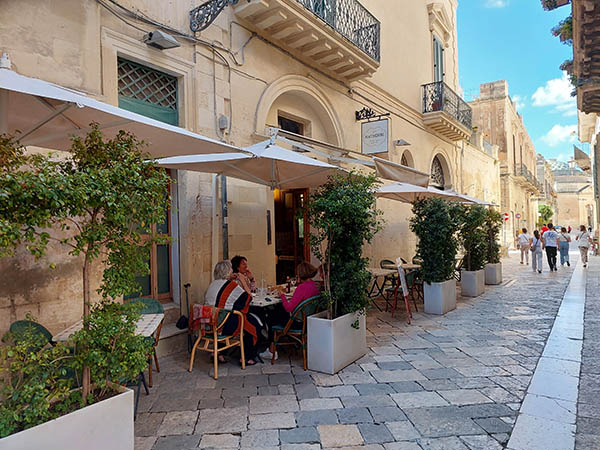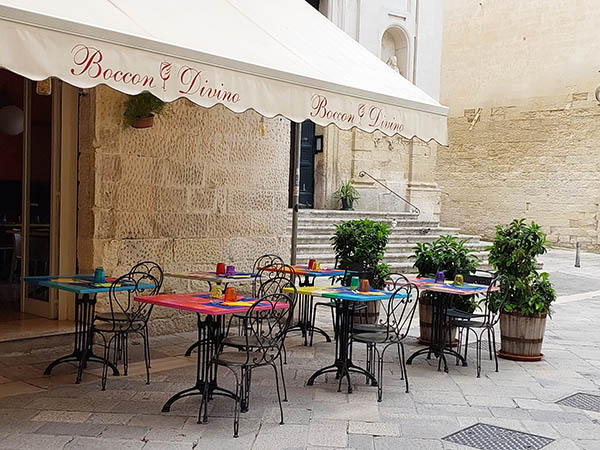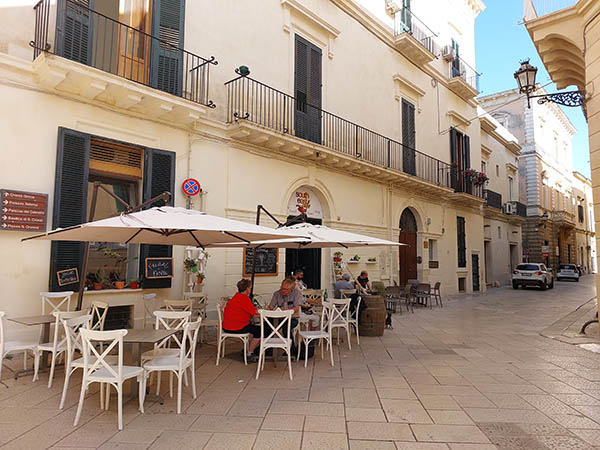|
Retire Early
Lifestyle
Retirement; like your parents, but way cooler

|
In 1991 Billy and Akaisha Kaderli retired at the age
of 38. Now, into their 4th decade of this
financially independent lifestyle, they invite you
to take advantage of their wisdom and experience. |
|
Cafes in
Lecce, Italy
Billy and Akaisha Kaderli
Currency Converter
I'm going to tell you a
story about an illicit and dangerous activity.
One that most of you
reading this probably partake in without a second thought.
What in the world am I
speaking about?
Consuming
coffee.
History shows that people
have been arguing about this drink for over 500 years.
In fact, there were times
when coffee was illegal and one could be killed or jailed for sipping this
beverage in public.
Today in Lecce, Italy,
cafes are everywhere!

A beautiful gardened cafe in Lecce
Indoor/outdoor restaurants and cafes are
traditional in Europe, and Italy is no different.
In days gone by,
these cafes tended to be places where the upper classes, artists, and intellectuals
congregated. It was where one got "the talk of the town."
Conversations focused on
economic life exchange or political topics and this became central to the
European way of life.

Cafe and restaurant
Captains of ships frequented this
"transatlantic network of coffee houses" where they could read newspapers and
discuss current events with merchants and businessmen.
Men from the artisanal
classes would also join in and these cafes served as "penny universities"
allowing people to share ideas, philosophies, open their perspectives and enrich their mental knowledge.
Naturally, the religiously and politically
powerful found the drink - and
the
coffee houses that served it - to be threatening.
Can't have ideas floating around freely, you
know.
That's a very dangerous
practice and can only lead to trouble.
In
Chapala,
Mexico where we live, we would
call these exchanges the "taco telegraph."
Want to find out what is going on in town?
Go to
a cafe or open bar.

Cafes and restaurants line the streets
At one point in history, the drinking of
coffee was outlawed as it was perceived to stir up trouble in the masses.
Probably because drinking coffee with its energizing caffeine got people to thinking of
their economic situations and to look for solutions to their problems.
You might have heard that the French
Revolution was planned in coffee houses, where members of the so-called
"intelligentsia," the class of political thinkers and polemics, gathered to plot
their rebellions.
But the
coffee houses' potential to
facilitate the exchange of ideas and information scared leaders long before the
French Revolution.
In 1511, Khair Beg, a young governor of
Mecca, called for the closure of all coffee houses, fearing they'd be centers of
secular uprising. Anyone caught drinking or selling coffee at that time was
beaten.
Yikes!

Caffee Paisiello
As with anything the government or religious
institutions want to prohibit, certain doctors are promoted to put out information
supporting the ban.
Today, we would call that disinformation.
In 1611, two Persian doctors claimed the
beverage enabled violent thoughts and vile characteristics and should be
outlawed.
In Europe, coffee critics likened the drink
to wine and attempted to outlaw it on this basis many times. Some claimed coffee
caused impotence.
The Wine and Beer industries felt attacked by
the rise in popularity of drinking coffee, and religious leaders asked the Pope
to bar coffee as a satanic novelty.

Men enjoying each other's company
The discussion of news, politics and
criticizing the government freely and without fear was common.
Coffee houses became go-to places for
conversation, socializing, and disagreeing.
They were a new social space that encouraged
class mixing and energetic conversation about cities and governments.
Business was conducted and mail was dropped
off and picked up.
The houses became so
popular for gathering that they started competing with taverns, and detractors
came out of the woodwork.

One lovely cafe after another
In the Grand Café in Oxford, England 17th-century
luminaries gathered to discuss a whole range of ideas based on reason—what we
now refer to as the Enlightenment.
It was in coffee houses that our modern ideas of liberty, progress,
tolerance, and fraternity were born.
Paris is a cradle of life, and there is a
whole "barista culture" that thrives there today.
In the US, coffee houses also became popular
meeting places for the politically charged, the same way they did in Europe.
Coffee houses were being built before the American Revolutionary war, but unlike
the ones in Europe, they were primarily for men.
Even though those in power often considered
closing any and all coffee houses, coffee was just too
popular and
profitable.
Coffee had made its way around the known
world, and by the end of the 16th century, the Ottoman court had an official
coffee maker, hundreds of coffeehouses dotted Istanbul, and the government
officially declared coffee and coffeehouses completely legal.
Hey, thanks Guys!

Menu sandwich board
So the bans stopped—although rulers still
posted spies in coffee houses to monitor anti-regime chatter, a practice some
autocrats maintain to this day.
Some people, no matter what
station they hold in life, are afraid of innovation.
Coffee was something new
and the houses that served it opened up new spaces for engagement and thought.
Something so simple as this can seem to wash away old attitudes and etiquettes.
Such modernization and
critical thinking can challenge the norm and be considered provocative.

Cafes are part of the neighborhood
In America in the late 1980s, the computer
and telecommunications revolution exploded. A hybrid between the café and the
emerging Internet developed in Silicon Valley called the cyber café.
These shops, wired by both
caffeine and electronics, proliferated around the world.
Coffeehouses became an integral part of
liberal-middle and upper-middle-class culture, sometimes called "Bobo," for
bourgeois-bohemian.
These cafes in Lecce show you how common the
custom is today of drinking coffee and sharing opinions. For now, there is no
more beheading or being sent to prison.
Just a delicious cup of Joe and
an amazing
pastry!
For more stories, photos and videos of
Italy, click
here
For more on
Retirement Topics,
click here and
here

About the Authors



Retire
Early Lifestyle appeals to a different
kind of person – the person who prizes their
independence, values their time, and who doesn’t
want to mindlessly follow the crowd.
HOME
Book Store
Retire Early Lifestyle Blog
About Billy & Akaisha
Kaderli
Press
Contact
20 Questions
Preferred
Links
Retirement
Country Info
Retiree
Interviews
Commentary
REL
Videos
|